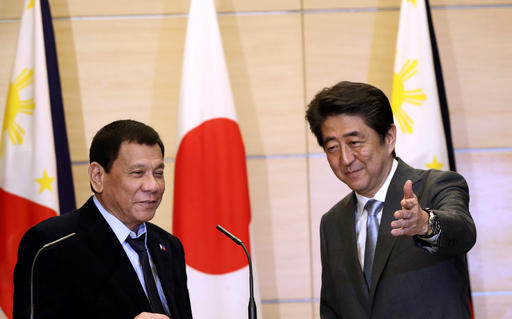
Philippine President Rodrigo Duterte, left, is shown the way by Japanese Prime Minister Shinzo Abe after a joint press conference following their meeting at Abe’s official residence in Tokyo, Wednesday, Oct. 26, 2016. AP
TOKYO—After deciding to cancel joint military drills with the United States, President Duterte on Thursday said he was open to joint naval exercises with Japan.
“The joint exercise? Yes, of course,” Mr. Duterte said in a talk with reporters in Yokohama, where he visited the regional headquarters of the Japan Coast Guard on the last day of his three-day official visit to Japan.
He said the joint exercises were discussed with Japanese officials in “general terms.”
Japan is providing the Philippines new Coast Guard vessels to help increase its maritime security capability.
Mr. Duterte said the vessels would be used for patrols in Philippine territorial waters in the South China Sea.
Loan for ships
During Mr. Duterte’s visit, Japanese and Filipino officials signed an official development assistance loan agreement for the provision to the Philippines of two large Coast Guard patrol vessels.
Japan will eventually deliver 10 Coast Guard vessels to the Philippines.
As for a visiting forces agreement with Japan, Mr. Duterte said the topic was not brought up during his meeting with Japanese Prime Minister Shinzo Abe on Wednesday.
Mr. Duterte said on Wednesday he wanted all foreign troops out of the Philippines in two years, a clear reference to US counterterrorism forces in Mindanao.
No more war games with US
He reiterated that the joint exercises with US troops earlier this month were the last of his six-year presidency.
Mr. Duterte also said he would review the Enhanced Defense Cooperation Agreement, which allows US forces to use five Philippine military bases, and “ask them one of these days to leave the country.”
During his state visit to China last week, Mr. Duterte, who styles himself as a socialist, declared his “separation” from the United States and “realignment” with China, baffling Washington, which has not received official notice of a change in relationship from Manila, and causing worries in Japan, a staunch US ally and host to 50,000 American troops.
Mr. Duterte has often spoken of distancing the Philippines from the United States, often in crude terms.
His antipathy toward Washington derives in part from US criticism of his brutal campaign against illegal drugs, which has cost the lives of more than 3,700 people.
The US state department has expressed concern about alleged extrajudicial killings and two US senators have threatened to cut aid to the Philippines over violation of human rights in the campaign.
Anti-US grievances
At dinner with Abe on Wednesday, after a first round of talks, Mr. Duterte said he explained his anti-American grievances to the Japanese leader.
Abe had been expected to ask Mr. Duterte about his “independent foreign policy” during their second round of talks, but the Philippine leader told reporters in Yokohama on Thursday that the Japanese premier did not try to mediate between him and Washington.
“Because he understands. They have a problem with narcotics here,” Mr. Duterte said.
He said he told Abe that every time there was an issue, whether human rights or some other thing, the United States treated the Philippines like a dog on a leash, taunting it to come after a treat.
“And then the favorite catchword, ‘We will stop the aid and assistance,’” he added.
Mr. Duterte said Abe did not say anything after he had explained his resentment toward the United States to him.
‘Very courteous man’
“To his eternal credit, Mr. Abe is a very courteous man,” he said.
Mr. Duterte extolled the strong ties between the Philippines and Japan, which are marking 60 years of diplomatic relations.
“This is a relationship that stands on unshakable, firm ground by all counts,” he said.
He expressed appreciation for Japan’s deep and broad involvement in Mindanao’s development, and said he hoped it would be the same for the rest of the Philippines.
Mr. Duterte also thanked Japan for its concern and respect. Japan, he said, is “a friend closer than a brother.”
Abe said there was a “deep, warm, family-like or brotherly relationship” between Japan and the Philippines.
“My sincere hope is to develop our future in full bloom together,” he said.
Maritime security
In a press conference after his first round of talks with Abe on Wednesday, Mr. Duterte said he expected Japan to continue being an important part of maritime security in the region, including the South China Sea, where the Philippines and China have overlapping claims.
In a statement, the two sides acknowledged the importance of “their network of friendship and alliances,” particularly one between them.
Japanese Deputy Chief Cabinet Secretary Koichi Hagiuda told reporters that the two countries’ alliances with the United States were recognized, though not in writing.
Mr. Duterte, in his second round of talks only among close aides, reassured Abe that he had no intention to sever diplomatic ties with the United States, Hagiuda said.
Japan ‘very impressed’
Mr. Duterte’s spokesperson, Ernesto Abella, said one senior Japanese official told him that “they were very impressed with the President.”
“They were impressed with his passion to protect his people and his passion for the Filipino people. They said this is the first time, one of the very rare times, a leader has been received like this,” Abella said.
He said Mr. Duterte’s profanity-laced language had not dampened Japan’s view of him.
“They understand his language can be hard sometimes, but they understand the intention, the motivation. So on the whole, the relationship between Japan and the Philippines has gone beyond formality and, really, we have connected in a very distinct and a very special way to the Japanese people and to the Japanese leadership,” Abella said. —WITH A REPORT FROM AP